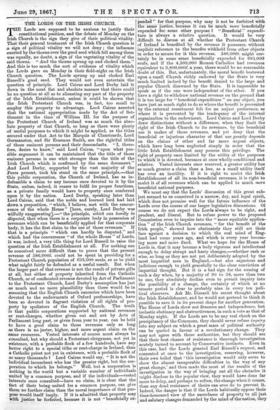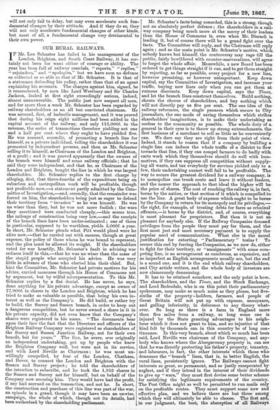THE LORDS ON THE IRISH CHURCH.
HE Lords are supposed to be anxious to justify their constitutional position, and the debate of Monday on the Irish Church is the sign they give of their political vitality. That their general treatment of the Irish Church question is sign of political vitality we will not deny ; the influence exerted by the thorns over the good seed which fell among them was equally, no doubt, a sign of the vegetating vitality of the said thorns. "And the thorns sprung up and choked them." And this is too much the sort of evidence of vitality which the Lords gave on Monday in their field-night on the Irish Church question. The Lords sprung up and choked Earl Russell's good seed. They would not even entertain the question of principle. Lord Cairns and Lord Derby laid it down in the most flat and absolute manner that there could be no question at all as to alienating any part of the property .of the Irish Establishment, unless it could be shown that the Irish Protestant Church was, in fact, too small to employ this property to advantage. Lord Cairns asserted that the national appropriation made by the Act of Set- tlement in the time of William III. for the purpose of the Protestant Church of Ireland was as much the abso- lute property of that Church, so long as there were plenty of useful purposes to which it might be applied, as the titles secured under that Act to the Marquis of Clanricarde, Lord Gormanston, and Sir Erasmus Smith, are the rightful titles "of those eminent persons and their descendadts. "I, there- fore, desire to know," said Lord Cairns, "upon what pos- sible argument it can be maintained that the title of those eminent persons is one whit stronger than the title of the Irish Church which is confirmed by the same document." And Lord Derby, supported by the vast majority of the Peers present, took his stand on the same principle,—that this public corporation, the Church of Ireland, has as in- defeasible a claim to any income once devoted to it by the State, unless, indeed, it ceases to fulfil its proper functions, as a private family would have to property once conferred upon it by the nation. Lord Derby, speaking later than Lord Cairns, said that the noble and learned lord had laid down a proposition, "which, I believe, met with the concur- rence of the whole House" [here, surely, Lord Derby was wilfully exaggerating],—" the principle, which can hardly be .diTutecl, that when there is a corporate body in possession of revenues which can be beneficially applied for that corporate body, it has the first claim to the use of those revenues." If that is a principle "which can hardly be disputed," and which had the concurrence "of the whole House" of Lords, iL was, indeed, a very idle thing for Lord Russell to raise the question of the Irish Establishment at all. For nothing can be conceived more difficult than to prove that the present revenue of 586,000/. could not be spent in providing for a Protestant Church population of 693,000 souls, so as to yield what might fairly be defended as a useful result. But when the larger part of that revenue is not the result of private gifts at all, but either of property inherited from the Catholic Church, or of confiscated revenue devoted by Act of Parliament to the Protestant Church, Lord Derby's assumption has just as much and no more plausibility than there would be in assuming that the English Church canonries which have been devoted to the endowments of Oxford professorships, have been so devoted in flagrant violation of all rights of pro- perty by spoliators of the English Church. The truth is that public corporations supported by national revenues or rent-charges, whether given out and out by Acts of Parliament long past, or given from year to year, can be held to have a good claim to those revenues only so long as there is no juster, higher, and more urgent claim on the same resources. Vested interests of course must always be consulted, but why should a Protestant clergyman, not yet in 'existence, with a probable flock of a few hundreds, have any better right to a special tithe or rent-charge in Ireland, than a Catholic priest not yet in existence, with a probable flock of as many thousands Lord Cairns would say, "It is not the individual incumbent who has the greater right, but the cor- poration to which he belongs." Well, but a corporation is nothing in the world but a variable number of individuals united by a common purpose, and if the individuals—vested interests once consulted—have no claim, it is clear that the fact of their being united for a common purpose, can give them no further claim than the moral importance of that pur- pose would itself imply. If it is admitted that property may with justice be forfeited, because it is not "beneficially ex- pended " for that purpose, why may it not be forfeited with the same justice, because it - can be much more beneficially expended for some other purpose "Beneficial" expendi- ture is always a relative question. It would be very difficult to discuss at all whether the Protestant Church of Ireland is benefited by the revenue it possesses, without implicit reference to the benefits withheld from other objects in order to secure for it this revenue. 586,000/. might cer- tainly be in some sense beneficially expended for 693,000 souls, and if the 4,500,000 Roman Catholics had revenues equivalent to 3,800,000/. a year, there would be no reasonable doubt of this. But, unfortunately, the moral benefit bestowed upon a small Church richly endowed by the State is very much limited indeed by the benefit denied to the large and popular Church disowned by the State. It is impossible to speak as if the one were independent of the other. If you have a right to withdraw national revenue on the ground that it is too large for "beneficial expenditure" on any object, you have just as much right to do so where the benefit is prevented by the external resentment felt for an unjust preference, as where it is prevented by the inadequacy of the internal organization to the endowment. Lord Cairns and Lord Derby draw distinctions without a difference, when they limit the right of the Irish Church to its revenues, by the beneficial use it makes of those revenues, and yet deny that the beneficial or injurious character of that use greatly depends on the claims of other and far more urgent objects, which have long been neglected simply in order that the little Irish Establishment may possess this privilege. The right of property once limited by the utility of the purposes to which it is devoted, becomes at once wholly conditional and relative. Vested interests once reserved, a greater utility has as much greater a claim than a less, as a small utility itself has over an inutility. If it is right to mulct the Irish Establishment of all its non-beneficial revenues, it is right to mulct it of all revenues which can be applied to much more beneficial national purposes.
We must say that the Lords' discussion of this great sub- ject seemed to us conceived in a narrow, dry, and legal spirit, which does not promise well for the future influence of the Lords over the course of our larger legislative discussions. Of course we do not expect the Lords always to be right, and prudent, and liberal. But to refuse power to the proposed Commission even to inquire into the "more equitable applica- tion" of the Irish Church revenues, "for the benefit of the Irish people," showed how obstinately they still set their face against a decision to which the real mind of Eng- land had come years ago, and which is every year becom- ing more and more fixed. What we hope for the House of Lords is, that it may become a body vigorous and intellectual enough to delay abrupt and hasty changes,—whether rash or wise, so long as they are not yet deliberately adopted by the most impartial men in England,—but also sagacious and judicious enough to yield gracefully to the clear conviction of impartial thought. But it is a bad sign for the coming of such a day when, by a majority of 90 to 38, more than two to one, they absolutely decline even to permit inquiry into the possibility of a change, the certainty of which at no remote period is clear to probably nine in every ten poli- tical observers. Ask Mr. Disraeli his secret thought about the Irish Establishment, and he would not pretend to think it possible to save it in its present shape for another generation. The House of Lords show not firmness and independence, but inelastic obstinacy and obstructiveness, in such a vote as that of Monday night. If the Lords are to be any real check on the precipitancy of the Commons, they should never refuse inquiry into any subject on which a great mass of political authority can be quoted in favour of a revolutionary change. They may not agree with those authorities, but they should see that their best chance of resistance is thorough investigation acutely turned to account by Conservative instincts. Even in this case, had the Lords granted Earl Russell's request, and consented at once to the investigation, reserving, however, their own belief that this investigation would only serve to show the almost insuperable difficulties in the way of any great change,' and then made the most of the results of the investigation in the way of bringing out all the obstacles it might disclose to the popular view, they would have done far more to delay, and perhaps to soften, the change when it comes, than any dead resistance of theirs can ever do to prevent it. Indeed, the danger is that if the Lords habitually oppose their time-honoured view of the sacredness of property to all just and salutary changes demanded by the mind of the nation, they will not only fail to delay, but may even accelerate such fun- damental changes by their attitude. And if they do so, they will not only accelerate fundamental changes of other kinds, but most of all, a fundamental change very detrimental to their own power.































 Previous page
Previous page